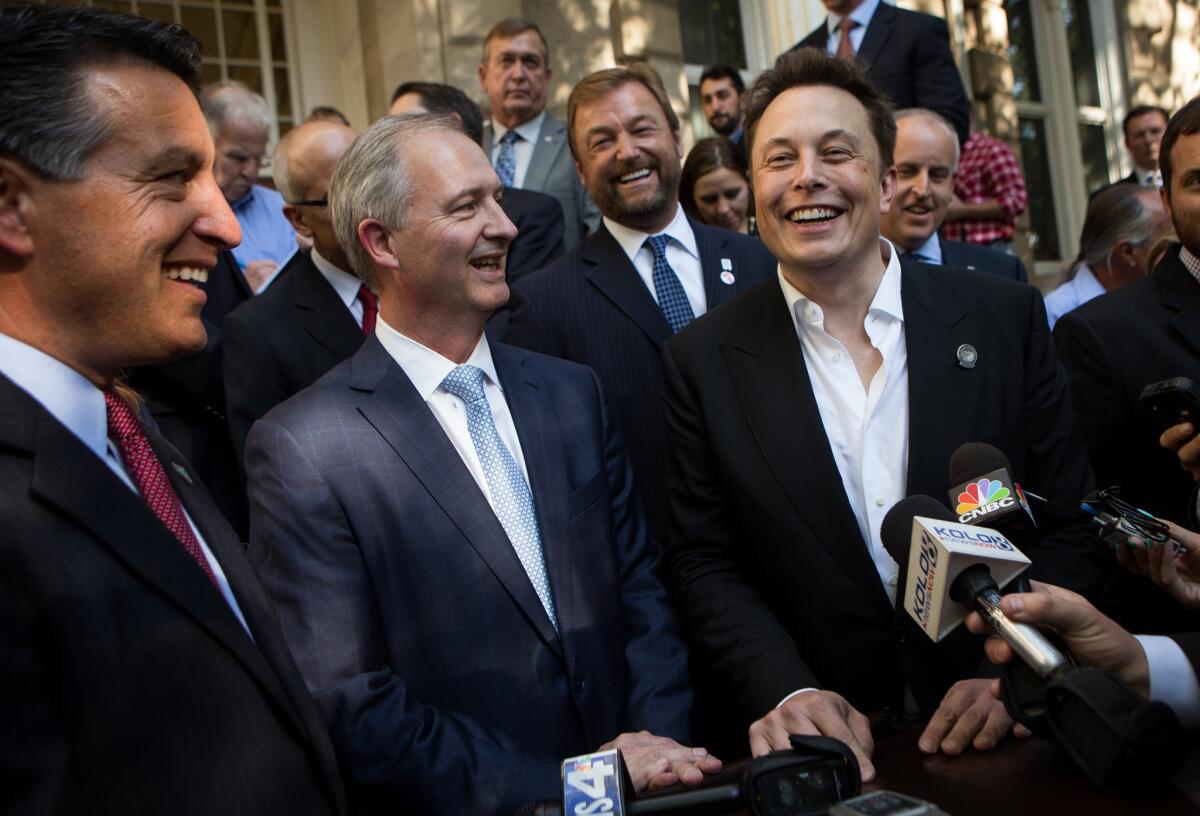On Location: Nevada’s Tesla tax package could slash funds for state’s film program

Tesla Motors may put the skids on Nevada’s fledgling film program.
At least that’s the fear among film industry supporters who are unhappy about a plan to finance a generous tax package for Tesla, partly at the expense of funds for film and TV production.
A deal crafted by Gov. Brian Sandoval would offer more than $1 billion in incentives to attract a Tesla battery factory and an estimated 6,500 jobs to the state.
But to pay for the tax breaks for the Palo Alto automaker, Nevada would slash funding from its film program to $10 million, down from the current level of $80 million over four years, according to the deal announced last week by Sandoval and the Governor’s Office of Economic Development.
The proposal comes less than a year after Nevada made a splash in Hollywood by offering film tax credits to attract movies and TV shows, taking advantage of its casinos and proximity to California. It will be reviewed by state lawmakers this week.
The proposed cut to the film program would make it harder to attract movies and TV shows to the state, said Chris Baum, president and chief executive of Reno Tahoe Studios, which operates three soundstages in the Reno-Sparks Convention Center.
The state’s new incentive, which took effect in January, has helped ramp up activity at the studios. Three movies and one cable TV series plan to film there, he said.
“Obviously, we’re excited about Tesla,” Baum said, “but this affects our ability to attract future productions. It means we will have a film incentive in the state, but it’s one that will have a very small potential to impact business.”
Representatives of the Nevada Film Office and the state’s Office of Economic Development declined to comment.
California lawmakers recently voted to triple annual funding for the state’s film subsidies. But Nevada could join several other states that have curtailed their programs in recent years, including New Mexico, Michigan and North Carolina. The latter recently replaced its film credit with a $10-million grant that critics said would gut the state’s film industry.
In Nevada, the union representing film crew workers expressed similar concern over the planned cut to the state’s new film incentive. Under the program, companies that spend a minimum of $500,000 and shoot at least of 60% of their movie in the state are eligible to receive a tax credit of up to 19% of qualified production costs.
“I totally support what Nevada is doing with the Tesla deal — it’s a great way to diversify the economy. But I also believe the film program is an excellent way to diversify the film economy, and the program is working,” said Randy Soltero, lobbyist for Local 720 of the International Alliance of Theatrical Stage Employees. “We’re only eight months into it, and we’ve already seen an increase in production and real folks going to work.”
The film funding cut could be a blow to Las Vegas. As The Times reported in July, casino operators such as Caesars Entertainment, Wynn Resorts and MGM Resorts International regard movies and TV shows as an increasingly valuable marketing tool and a way to lend some star power to their properties.
Recent projects that have taken advantage of the state tax credit program include “Paul Blart: Mall Cop 2,” an untitled movie starring Dakota Fanning and a horror film called “Lake Mead.” CBS this year filmed a pilot series in Las Vegas, which already is home to reality TV shows such as “Pawn Stars,” “Counting Cars” and “American Restoration.”
Times staff writer Charles Fleming contributed to this report.
More to Read
From the Oscars to the Emmys.
Get the Envelope newsletter for exclusive awards season coverage, behind-the-scenes stories from the Envelope podcast and columnist Glenn Whipp’s must-read analysis.
You may occasionally receive promotional content from the Los Angeles Times.







